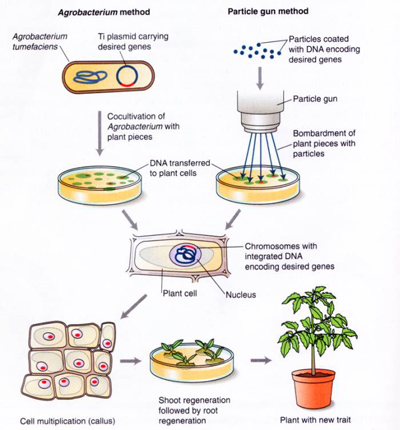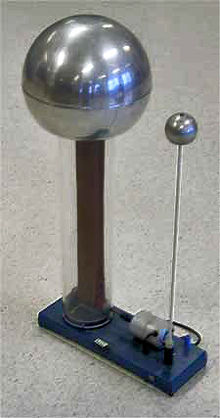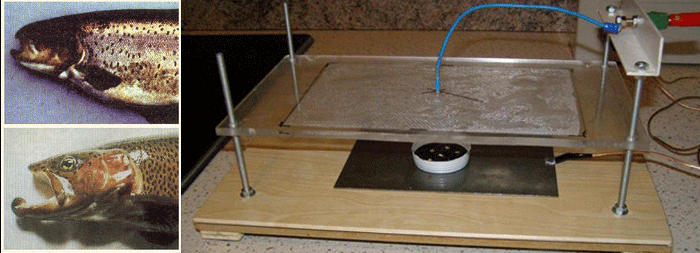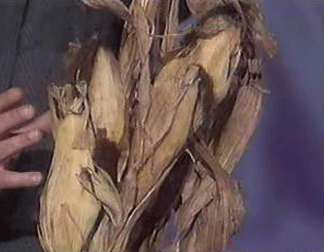

The "Primeval Code" -- the ecological alternative to controversial genetic engineering (GMO)!
Most people are unaware of this, nor are they aware of a remarkable discovery that could safely and naturally modify the genes of an organism.
Genetically Modified Organisms (GMO) are the cause of much anxiety and concern because they have made their way into our food supply without adequate information or our consent. Also, several studies over the past few years have revealed that GMO feed caused tumors and cancerous growths in animals.
The modifications are more often not improvements to the end product. The fruit or vegetable does not taste better or have more nurtients. Instead, these mutations are created to respond specifically to the fertilizers and pesticides manufactured by the same Agra-company.
The gene altering methods are crude. Large chunks of DNA code from other plants or animals are inserted so that the plant can make its own pesticide or can survive when exposed to a specific weed killer (like Monsanto's Roundup).
| Current GMO Methods for Altering DNA
 Vitaly Citovsky is a professor of molecular and cell biology at Stony Brook University in New York (SUNY). He is a world authority on the genetic modification of cells by Agrobacterium, a soil bacterium widely used in creating genetically modified (GM) plants since the 1980s. Vitaly Citovsky is a professor of molecular and cell biology at Stony Brook University in New York (SUNY). He is a world authority on the genetic modification of cells by Agrobacterium, a soil bacterium widely used in creating genetically modified (GM) plants since the 1980s.
"Agrobacterium has the ability to invade a plant and then insert a large amount of its own DNA sequence to growing cells in the plant which cause it to grow a tumor (called crown gall disease) which then produces nutrition for the bacteria to grow and proliferate. The shotgun method is even more crude. Plant cells are blasted with tiny pellets containing DNA material. Most of the pellets do nothing but some invade the plant cells and combine with the host DNA. Once the cells have been modified they are allowed to divide and eventually grow into a new modified plant or organism. Because large chunks of DNA were transferred, the resulting changes may include unwelcome modifications. And this is the concern. |
Can the global food problem at last be solved -- without using GMO?
In his book "Primeval Code" (Munich 2007) Swiss journalist Luc Burgin unveils the secret of a sensational biological discovery at the pharmaceutical giant Ciba (now Novartis), which unfortunately has been ignored by the experts -- even now.
In laboratory experiments the researchers, Dr. Guido Ebner and Heinz Schurch, exposed cereal seeds and fish eggs to an "electrostatic field" -- in other words, to a high voltage field, in which no current (or hardly any) flows. Typically a high voltage but low amperage DC current is used to charge two metal plates, separated by air. The plates create an electrostatic field and this influences the changes they observed.
The seeds and eggs they tested were placed between the charged plates for many hours to many days. They were then allowed to continue growing under normal conditions.
|
What is an electrostatic field?
 An electrostatic generator, or electrostatic machine, is a mechanical device that produces static electricity, or electricity at high voltage and low continuous current.
An electrostatic generator, or electrostatic machine, is a mechanical device that produces static electricity, or electricity at high voltage and low continuous current.You have likely experienced static electricity when you brushed your hair or felt a shock when you touched a metal doorknob in the winter. The knowledge of static electricity dates back to the earliest civilizations, but for millennia it remained merely an interesting and mystifying phenomenon, without a theory to explain its behavior and often confused with magnetism. By the end of the 17th Century, researchers had developed practical means of generating electricity by friction, but the development of electrostatic machines did not begin in earnest until the 18th century, when they became fundamental instruments in the studies about the new science of electricity. Electrostatic generators operate by using manual (or other) power to transform mechanical work into electric energy. Electrostatic generators develop electrostatic charges of opposite signs rendered to two conductors, using only electric forces, and work by using moving plates, drums, or belts to carry electric charge to a high potential electrode. The charge is generated by one of two methods: either the triboelectric effect (friction) or electrostatic induction. [wikipedia] |
Unexpected results
Unexpectedly primeval organisms grew out of these seeds and eggs: a fern that no botanist was able to identify; primeval corn with up to twelve ears per stalk; wheat that was ready to be harvested in just four to six weeks. And giant trout, extinct in Europe for 130 years, with so-called salmon hooks. It was as if these organisms accessed their own genetic memories on command in the electric field, a phenomenon which the English biochemist, Rupert Sheldrake, believes is possible.

[Left] Extinct hooked nose trout developed from electrostatic treatment of modern trout eggs. [Right] The apparatus used to administer the electrostatic field to the trout eggs.
The Swiss pharmaceutical group patented the process -- and then stopped the research in 1992. Why? Because "primeval cereals" generated by an electric field, in contrast to modern strains of seeds, require hardly any fertilizers or pesticides -- i.e. crop protection agents, sold as priority products by Ciba at that time. The discovery was soon forgotten, without the global scientific community taking any notice.
In collaboration with the researchers involved -- or rather their sons, in this book, the author has for the first time now disclosed in detail how the principle of this revolutionary bio-experiment works. Previously unpublished research reports, 64 exclusive photos, English-language patent specifications and interviews document the "Primeval Code" in all its aspects.
Skeptics take another look
Many scientists who think along conventional lines may remain skeptical about this inexplicable biological effect. But now, for the first time, renowned German botanists such as Professor Edgar Wagner of the University of Freiburg and Professor Gunter Rothe from the University of Mainz have make positive statements about it. Rothe even successfully replicated the Ciba experiments in detail at his university in 2001. Nobel laureate and world-famous Swiss microbiologist Werner Arber -- is defending this controversial discovery. After reviewing the evidence, Arber said, "I was impressed!"
Indeed, Guido Ebner and Heinz Schurch appear to have discovered a biological method of effectively creating antecedents from progeny -- without using genetic engineering. Or as they put it:
"Our experiments do not involve a mutation of the organism in question, which in the case of genetic engineering involves channelling an additional gene into the organism. No entirely new organism is created. In the electrostatic field, only the gene expression is altered -- the retrieval of the existing gene. That is something different."
 [Right] Electrostatically developed corn with six ears per plant.
[Right] Electrostatically developed corn with six ears per plant.
In addition to corn and trout experiments, the results of experiments with wheat were also amazing: thus the cereal exposed to the electrostatic field developed new proteins, which people looked for in the original wheat to no avail. Furthermore, it surprisingly produced much larger roots than the control group. This had the advantage of allowing the crops to grow far more rapidly. And occasionally in these experiments, a variant emerged which resembled the genetic antecedents of the wheat. Thus, a meadow grass-like arrangement of ear shoots and small narrow leaves was observed, for example.
"In the case of our 'manipulated' wheat, growth was so rapid that it was ripe in four weeks instead of the usual seven months. However one has to say that although the ears and stalks were somewhat smaller, there were more ears per plant. The actual benefit is that we could cultivate this wheat in regions where spring and summer are short -- where conventional wheat cannot be grown at all. In this case, one can also cheerfully refrain from using pesticides and herbicides: the pests that have adapted to the growth process of normal wheat have not yet developed when we harvest our wheat as early as four to eight weeks after planting."
Discussion...
The Third World in particular could benefit from this method of cultivation that is both environmentally friendly and inexpensive. For "primeval cereals" from an electric field yield more than modern genetically engineered varieties and do not require fertilisers. Furthermore, it is completely natural and thus healthier. It can be grown by anybody at minimal cost.
After Guido Ebner and Heinz Schurch both passed away unexpectedly in 2001, their experiments were continued by Guido Ebner's son, Daniel -- himself a biologist -- on a private basis. He now wants to export this electric field technology to Africa as soon as possible, as part of an aid project, with the assistance of the former assistant to the UN Food Representative, Professor Jean Ziegler, in order to make it available to local farmers -- free of charge, as an ecological alternative to the controversial genetically engineered seeds of the international agro-multinationals.
[source]
